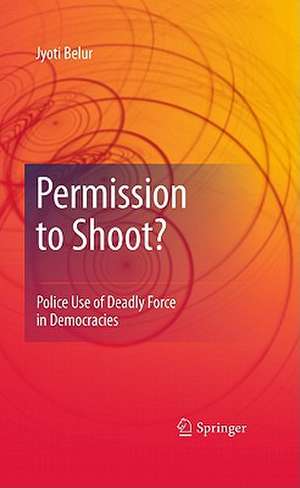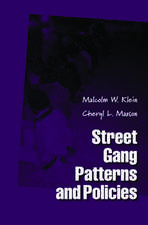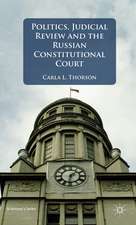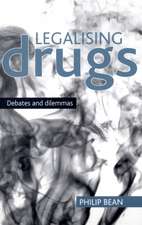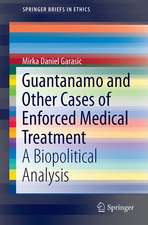Permission to Shoot?: Police Use of Deadly Force in Democracies
Autor Jyoti Beluren Limba Engleză Hardback – 6 oct 2010
In the book, the research is based on primary sources—interviews with police officers of varying ranks: those who are involved in the killings; those who facilitate such operations; and those who are mute spectators. The book deals with universal, fundamental themes such as: what makes ordinary, decent human beings do horrible things? What motivational techniques and justifications are used to override social norms governing moral conduct, centring on the sector of society mandated to use deadly force against civilians? Why in a democratic country the abuse of police powers appears to be overtly and tacitly encouraged?
Permission to Shoot? seeks to provide broad guidelines and recommendations for reforms in policing policy and practice in developing countries. The research peels back the lies and deceit that surround this issue, but more than that it shows how those lies and deceit act to support the practice itself.
| Toate formatele și edițiile | Preț | Express |
|---|---|---|
| Paperback (1) | 724.32 lei 6-8 săpt. | |
| Springer – 5 sep 2014 | 724.32 lei 6-8 săpt. | |
| Hardback (1) | 730.35 lei 6-8 săpt. | |
| Springer – 6 oct 2010 | 730.35 lei 6-8 săpt. |
Preț: 730.35 lei
Preț vechi: 890.66 lei
-18% Nou
Puncte Express: 1096
Preț estimativ în valută:
139.76€ • 149.44$ • 116.52£
139.76€ • 149.44$ • 116.52£
Carte tipărită la comandă
Livrare economică 18 aprilie-02 mai
Preluare comenzi: 021 569.72.76
Specificații
ISBN-13: 9781441909749
ISBN-10: 1441909745
Pagini: 244
Ilustrații: XVII, 226 p.
Dimensiuni: 155 x 235 x 20 mm
Greutate: 0.52 kg
Ediția:2010
Editura: Springer
Colecția Springer
Locul publicării:New York, NY, United States
ISBN-10: 1441909745
Pagini: 244
Ilustrații: XVII, 226 p.
Dimensiuni: 155 x 235 x 20 mm
Greutate: 0.52 kg
Ediția:2010
Editura: Springer
Colecția Springer
Locul publicării:New York, NY, United States
Public țintă
ResearchCuprins
Police and the Use of Deadly Force.- A Tale of Three Cities.- Policing and Organised Crime in Mumbai.- Defining Encounters.- Are Encounters Effective? Police Role and Police Image.- A Culture of Complicity? Social Attitudes Towards Encounters.- Justifying Encounters: The Theory of Denial.- Explaining Encounters: What Can We Do About Them?.- Appendix: Methodology.
Notă biografică
Jyoti Belur is a Research Associate at the Jill Dando Institute of Crime Science, University College London in London, UK. After obtaining a Masters degree in Economics from the University of Mumbai, she briefly worked as a lecturer of Economics at that university. She then joined the Indian Police Service and served as a senior police officer in the North of India. During her training period at the National Police Academy in Hyderabad she completed a Masters in Police Management (Osmania University). She has since then done another Masters degree in Human Rights at the University of Essex in the UK, after which she completed her PhD at the London School of Economics. Her recent research activities at the Jill Dando Institute include a consultancy project for the London Metropolitan Police to help them get a better understanding of the Muslim communities in a number of London boroughs. Dr. Belur’s key areas of interest are policing and police studies, terrorism and processes of radicalization and extremism.
Textul de pe ultima copertă
Extrajudicial executions by law enforcement officers have blighted parts of the world for generations, but criminological coverage has been superficial and selective. It has often been presented as a problem specific to countries associated with military rule, dictatorial regimes and colonial heritage. Permission to Shoot?: Police Use of Deadly Force in Democracies brings a new dimension to the problem of police abuse of deadly force by concentrating on the social and political settings in India and the United States, both large democracies and vibrant superpowers.The research in the book is based on primary sources—interviews with police officers of varying ranks: with those who are involved in the killings; with those who facilitate such operations, and with those who are mute spectators. The book deals with universal, fundamental themes such as:• Why is it that in a democratic country the abuse of police powers can appear to be overtly and tacitly encouraged?•What motivational techniques and justifications are used to override social norms governing moral conduct, centring on the sector of society mandated to use deadly force against civilians? • What makes ordinary, decent human beings do horrible things? Permission to Shoot? seeks to provide broad guidelines and recommendations for reforms in policing policy and practice. The research peels back the opaque communication that often surrounds this issue, but more than that it shows how that kind of communication acts to support the practice itself.
Caracteristici
One of the few books on the topic of police use of force based on primary ethnographic research (interviews with police officers) First book to focus on the problem of police violence in India as well as other major countries Compares social and political climates surrounding police shootings in New York, London, and Mumbai Includes supplementary material: sn.pub/extras
